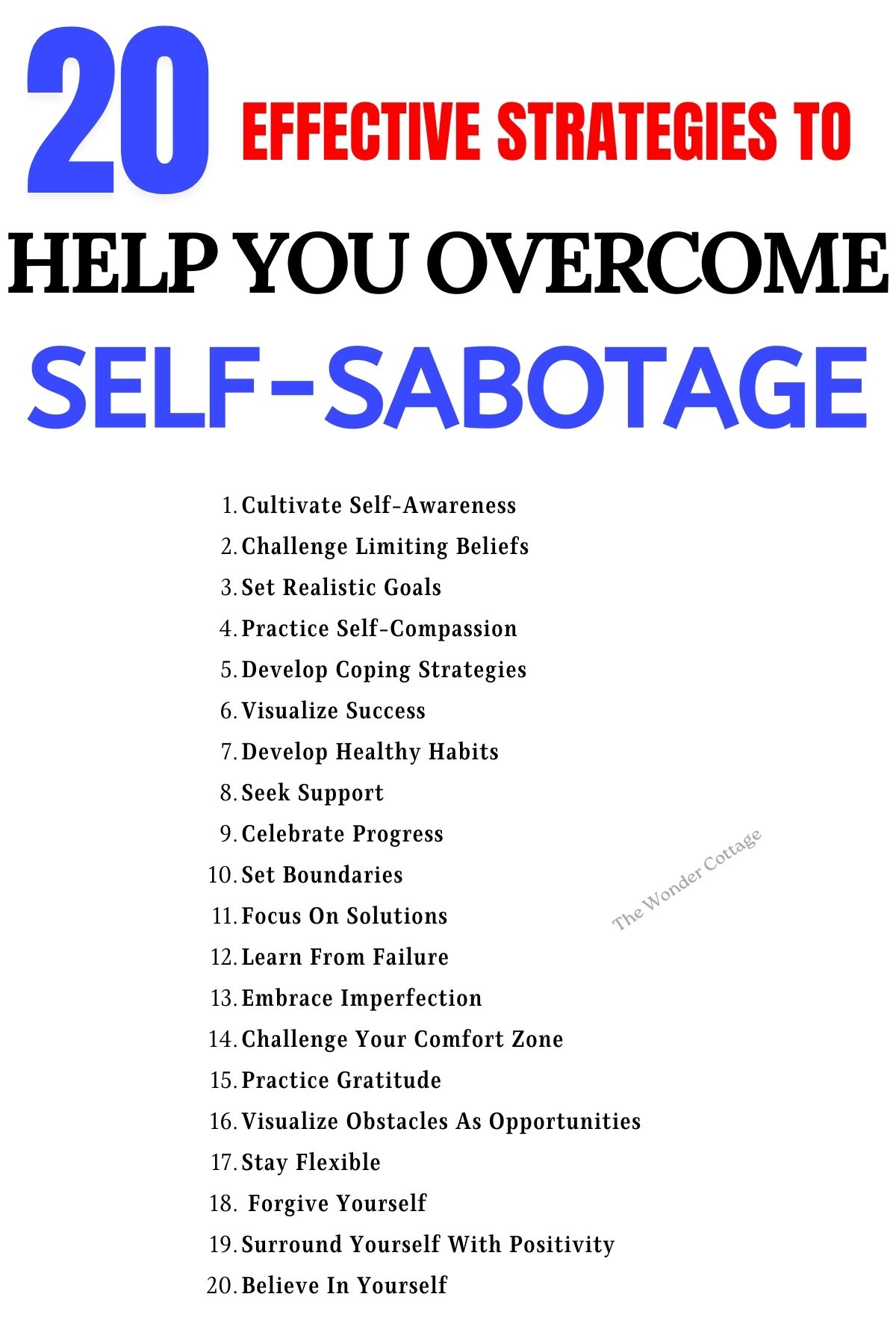Self-sabotage is a common phenomenon, where individuals engage in behaviors that ultimately undermine their own success and well-being. It can manifest in various ways, such as procrastination, self-doubt, negative self-talk, and destructive habits. While self-sabotage can be frustrating and challenging to overcome, there are strategies that can help individuals avoid falling into this harmful cycle.
In this post, we explore the complicated processes of self-sabotage, revealing its basic causes, comprehending its effects on our lives, and learning how to combat its persistent influence.

Understanding Self-Sabotage
Self-sabotage can be a frustrating and destructive pattern that many people struggle with throughout their lives. It often goes unnoticed or is misinterpreted as laziness or lack of motivation, when in reality, it is a complex psychological phenomenon that requires a deeper understanding to overcome.
One of the first steps in addressing self-sabotage is recognizing the patterns and behaviors that are holding us back. This may involve taking a closer look at our thought processes, beliefs, and reactions to certain situations. Are we constantly criticizing ourselves and setting impossibly high standards? Are we avoiding tasks or challenges out of fear of failure or rejection? By becoming more aware of these habits, we can start to identify the root causes of our self-sabotaging behaviors.
Once we have identified these patterns, it is important to explore the underlying beliefs and fears that are driving them. These beliefs are often deeply ingrained from childhood or past experiences, and may include feelings of unworthiness, fear of success, or a need for control. By examining these beliefs and challenging their validity, we can begin to reframe our mindset and create new, healthier thought patterns.
In addition to working on our internal beliefs, it is also helpful to develop practical strategies for overcoming self-sabotage. This may involve setting realistic goals, creating a support network, practicing self-care, or seeking professional help. By taking proactive steps to address our self-sabotaging behaviors, we can start to break free from the cycle of negativity and move towards a more fulfilling and balanced life.
Understanding self-sabotage is a valuable tool in our personal growth and development journey. By gaining insight into our behaviors and thought patterns, we can begin to make positive changes that will lead to a happier, more fulfilling life. Remember, self-sabotage is a common struggle that many people face, and it is never too late to start working towards overcoming it. With self-awareness, determination, and support, we can break free from self-sabotage and create a life that aligns with our true desires and goals.
Root Causes Of Self-Sabotage
A complex interaction between psychological, emotional, and behavioral elements is the core cause of self-sabotage. Trauma, abandonment, or harsh criticism throughout childhood can plant the seeds of inadequacy and self-doubt, reshaping our views of our own skills.
Unresolved emotional wounds like rejection, abandonment, or betrayal may worsen feelings of worthlessness and insecurity, which can lead us to engage in self-destructive activities in an attempt to find acceptance and approval.
In addition, societal ideas of success and failure, social conventions, and societal expectations can all support the continuation of self-sabotage. Fear of being judged, rejected, or disappointed can make us play it safe, accept inferiority, or shy away from taking chances that might bring us fulfillment and growth. In summary, self-sabotage creates cycles of self-limitation and stagnation by growing in the shadows of our subconscious minds.
Recognizing Patterns Of Self-Sabotage
Understanding the recurrent behaviors and attitudes that support self-sabotage is essential for escaping its hold. Common examples of self-sabotage include procrastination, self-criticism, negative self-talk, and avoidance habits, which may hinder our progress and limit our potential.
These behaviors frequently develop in reaction to perceived challenges to our identity, feelings of security, or self-worth, which causes us to retreat into well-known patterns of self-defeating behavior.
Moreover, self-sabotaging ideas and behaviors that undermine our self-assurance and fortitude can also be exhibited as self-sabotage. Thoughts like “I’m not good enough,” “I don’t deserve success,” or “I’m destined to fail” have the power to become self-fulfilling prophecies, influencing how we view ourselves and our potential.
We can start to question and change these self-defeating behaviors and beliefs by becoming aware of them, which will open the door to our own personal development and transformation.

20 Effective Strategies To Help You Overcome Self-sabotage
Overcoming self-sabotage requires a conscious and intentional effort to confront our fears, challenge our beliefs, and cultivate self-awareness and self-compassion. Here are some strategies to help break free from the cycle of self-sabotage.

1. Cultivate Self-Awareness
To overcome self-defeating patterns, one must first develop self-awareness and recognize the ideas, feelings, and actions that lead to self-defeating patterns. Journaling, self-reflection, and mindfulness exercises can help shed light on the root causes of self-sabotage as well as point out areas that can be improved.
2. Challenge Limiting Beliefs
Take on the self-defeating ideas and restrictive attitudes that are undermining your self-worth and confidence. Positive statements of competence, adaptability, and self-worth should take the place of negative self-talk.
Develop a growth attitude that views obstacles, mistakes, and disappointments as chances for improvement.

3. Set Realistic Goals
Set realistic, achievable goals that align with your values, passions, and aspirations. Break down larger goals into smaller, manageable steps, and avoid setting yourself up for failure by setting unrealistic expectations or comparing yourself to others.
4. Practice Self-Compassion
Practice self-compassion and kindness towards yourself, especially in moments of struggle or setback. Treat yourself with the same empathy and understanding that you would extend to a close friend facing similar challenges. Embrace your imperfections and embrace the journey of self-discovery and growth.
5. Develop Coping Strategies
Create efficient ways to handle anxiety, worry, and stress. Take part in mind-body-spirit nourishing activities like physical activity, meditation, art, or time spent in nature. When necessary, seek assistance from dependable family members, friends, or mental health specialists.

6. Visualize Success
Visualize yourself succeeding and achieving your goals. Use visualization techniques to imagine overcoming obstacles and reaching your desired outcomes. Visualizing success is a powerful tool for overcoming self-sabotage and achieving your goals.
You can picture yourself reaching your desired result in your mind when you imagine success. By reprogramming your subconscious mind to support your objectives, this technique will increase your motivation and self-assurance.
You may clearly define what success means to you with the use of visualization. You can obtain an understanding of what you really want to do by visualizing yourself achieving your goals, which helps keep you motivated and focused.
7. Develop Healthy Habits
Cultivate healthy habits that support your well-being, such as regular exercise, balanced nutrition, adequate sleep, and stress management techniques. A key strategy for overcoming self-sabotage and attaining long-term success in a variety of areas of life is forming good habits.
In addition to improving physical well-being, healthy behaviors are essential for developing durability, improving productivity, and promoting a positive outlook. Maintaining healthy behaviors requires self-control and regular practice.
Routines like consistent exercise, a healthy diet, enough sleep, and mindfulness exercises help you develop self-discipline, which makes it simpler to withstand temptations that cause self-sabotage.

8. Seek Support
Reach out to friends, family members, or a therapist for support and encouragement. Share your struggles and goals with trusted individuals who can offer guidance and support. Seeking help may be an effective balance to self-defeating, providing motivation, direction, responsibility, and togetherness on your path to achievement and personal development.
You may break free from self-destructive tendencies and design a life that is resilient, fulfilling, and full of genuine self-expression by surrounding yourself with positive people and gaining access to resources that support your objectives.
Support groups provide a range of viewpoints and methods for overcoming self-defeating behaviors. You can experiment with many strategies and determine which one most closely matches your particular situation and preferences by talking to a range of others who have overcome comparable obstacles.

9. Celebrate Progress
Celebrate your achievements, no matter how small. Acknowledge your progress and accomplishments along the way to boost your confidence and motivation. Rewarding yourself for making progress is essential to overcoming self-sabotage and keeping up motivation toward your objectives.
All too frequently, people lose sight of the importance of the steps taken along the journey and concentrate only on the outcome. Honoring your accomplishments gives you good reinforcement for your work. It can inspire you to keep going in the face of obstacles or disappointments by serving as a reminder of how far you’ve come.
Related Posts

10. Set Boundaries
Establish clear boundaries to protect your time, energy, and emotional well-being. Learn to say no to commitments and obligations that drain your resources. To overcome self-sabotage and promote positive connections with others and oneself, it is essential to set boundaries.
Establishing boundaries protects your well-being and upholds your priorities and beliefs by defining appropriate conduct, relationships, and limits. It’s necessary to consider your requirements, values, and priorities before establishing boundaries.
You can create a framework for self-respect and self-care by outlining your unique boundaries and what is and is not acceptable to you. This will make it simpler to identify and deal with actions or circumstances that could cause self-sabotage.
Setting limits entails becoming aware of your feelings, ideas, and bodily experiences in order to recognize when those boundaries are being crossed or broken. You may identify patterns of self-sabotage and take proactive measures to safeguard your well-being and meet your needs thanks to this increased self-awareness.
11. Focus On Solutions
Instead of dwelling on problems or setbacks, focus on finding solutions and taking proactive steps toward your goals. A responsible and empowering strategy for overcoming self-sabotage and skillfully managing obstacles is to concentrate on solutions.
When faced with challenges or disappointments, it’s normal to obsess over issues and let depressing ideas and feelings take over. On the other hand, turning your attention to solutions promotes a driven by-growth, resilient, and resourceful mindset.
12. Learn From Failure
View failure as an opportunity for learning and growth rather than a reflection of your worth or ability. Extract lessons from setbacks and use them to inform future actions. To overcome self-sabotage and achieve both personal and professional success, it is essential to acquire the talent of learning from failure.
You may develop toughness, versatility, and a growth attitude that will enable you to overcome obstacles, go after your objectives, and reach your full potential by accepting failure as a teacher rather than a hindrance. Remind yourself to treat yourself with kindness as you grow from your mistakes, acknowledge your accomplishments, and keep taking fearless, determined steps ahead.
13. Embrace Imperfection
Accept that perfection is unrealistic and unattainable. Embrace imperfection as a natural part of the human experience and an opportunity for growth. Accepting imperfections is a powerful solution for self-defeating behavior.
You may free yourself from the bonds of perfectionism and make room in your life for more joy, fulfillment, and connection by accepting your humanity, engaging in self-compassion exercises, and placing a high value on honesty and progress.
Keep in mind that imperfections are what make you wonderfully human as you travel on the road of self-acceptance and self-discovery.
14. Challenge Your Comfort Zone
Step outside your comfort zone and embrace new experiences and challenges. Pushing your boundaries can help you overcome fears and self-imposed limitations. A powerful technique for overcoming self-sabotage and gaining access to toughness and personal growth is to push yourself beyond your comfort zone.
Your comfort zone is a mental place where habits and actions seem comfortable and safe, but it can also serve as a refuge for patterns of inaction and self-defeating behavior. You are exposed to fresh problems, viewpoints, and experiences when you venture outside of your comfort zone.
Your ability to adapt is enhanced by this exposure, as you get experience adjusting to new circumstances and growing used to change. Recognizing the uncertainty that accompanies growth and adjusting to new circumstances are common strategies for overcoming self-sabotage.

15. Practice Gratitude
By concentrating on the positive parts of your life, cultivate an attitude of thankfulness. Maintain a thankfulness diary and take time each day to consider all that you have to be grateful for. You can overcome self-sabotage and develop a stronger and more satisfying life by engaging in the transforming practice of gratitude practice.
You may use thankfulness to change your perspective, improve your relationships, and motivate constructive action by recognizing the opportunities, strengths, and blessings that are all around you. By developing an attitude of gratitude, you enable yourself to face life’s obstacles with courage, grace, and appreciation.
16. Visualize Obstacles As Opportunities
Consider challenges and disappointments as chances for personal development. Instead of seeing obstacles in the way of your ambitions, see setbacks as stepping stones. A powerful mental shift that helps you overcome self-sabotage and face challenges with resiliency, creativity, and optimism is seeing obstacles as opportunities.
You can use hardship to drive you toward your objectives if you reconsider failures as chances for personal development and education. By developing an attitude of potential and opportunity, you give yourself the ability to overcome challenges and prosper in the face of hardship.
17. Stay Flexible
Be willing to change your strategy and approach when conditions demand. When you are flexible, you can change directions and stay on track without surrendering to failure. The most important strategy for overcoming self-sabotage and facing the uncertainties and challenges that life frequently throws at us is to remain adaptable.
Being flexible enables you to keep a proactive and strong mindset, learn from mistakes, and react to changing situations. One of the most important strategies for overcoming self-sabotage and succeeding in the face of uncertainty and adversity is to remain adaptable.
Accepting flexibility, acceptance, and toughness gives you the capacity to face obstacles head-on and overcome them with elegance and determination, which will ultimately make it easier and more satisfying for you to fulfill your dreams. By developing an adaptable attitude and way of living, you open up doors for development, education, and personal fulfillment.

18. Forgive Yourself
Forgive yourself for past mistakes and failures. Let go of guilt and self-blame, and instead, focus on learning from the experience and moving forward with renewed determination. To overcome self-sabotage and develop inner peace and resilience, you must first forgive yourself.
This is a profound act of self-compassion and healing. Self-sabotaging actions might be motivated by feelings of guilt, shame, or self-criticism for perceived faults or past wrongdoing. These feelings can also keep you from moving forward.
Your emotional health suffers when you hold to guilt and self-blame, which also keeps you from truly experiencing the present. You may let go of these heavy feelings and become financially and emotionally free when you forgive yourself. Letting go of the past makes room for recovery and development.

19. Surround Yourself With Positivity
Surround yourself with positive influences and environments that uplift and inspire you. Minimize exposure to negativity and toxic influences that undermine your self-esteem and motivation. One of the most effective ways to stop self-sabotage and build a happy, fulfilling life is to surround yourself with positive people.
Building a community that encourages optimism, endurance, and personal development gives you the tools you need to overcome setbacks and confidently and passionately pursue your goals. While you surround yourself with good vibes, don’t forget to welcome learning opportunities, acknowledge your accomplishments, and extend compassion and support to others who are also seeking self-awareness and fulfillment.

20. Believe In Yourself
Cultivate belief in your abilities and potential. Trust yourself to overcome obstacles and persevere in the face of challenges. Believe that you are worthy of success and fulfillment. A transforming mentality that enables you to overcome self-sabotage and realize your greatest potential is believing in yourself. Building resilience, development mentality, and self-assurance pave the route for both career and personal success.
Remember to support your self-belief and welcome the seemingly limitless possibilities that are established ahead of you as you travel on the road of self-discovery and satisfaction. Having self-confidence gives you the ability to inspire and motivate other people. When you pursue your goals with persistence, confidence, and determination, you encourage everyone around you to have the same desires and to believe in themselves.
Your community’s level of self-sabotage decreases as a result of this feeling of empowerment among all members, which creates a good atmosphere that supports constructive attitudes and actions.
Thriving Beyond Self-Sabotage
By starting the process of overcoming self-sabotage, we give ourselves access to a variety of options and chances for development and happiness. We enable ourselves to live truly and courageously follow our passions by facing our anxieties, questioning our beliefs, and accepting our natural basis.
During the process, we learn that self-sabotage is a spark for self-discovery and transformation rather than an unreachable barrier. Through perseverance, empathy for oneself, and an openness to admitting weakness, we can go beyond the boundaries of uncertainty and anxiety and realize the completeness of our capabilities.
Conclusion
In summary, self-sabotage is a complicated and multidimensional behavior that can hinder our development, destroy our self-esteem, and restrict our opportunities for personal development and fulfillment.
However, we can release ourselves from its hold and flourish in all aspects of our lives by comprehending its fundamental mechanisms, identifying its patterns, and putting change plans into action.
Remember that we are deserving of love, acceptance, and success as we set out on the process of self-discovery and personal development. Let’s celebrate our underlying bravery and perseverance and have faith in our capacity to prevail over hardships and create meaningful, passionate lives.
Together, let’s overcome self-defeating behaviors and grab the countless opportunities that lie ahead for us as we pursue fulfillment and self-actualization.







